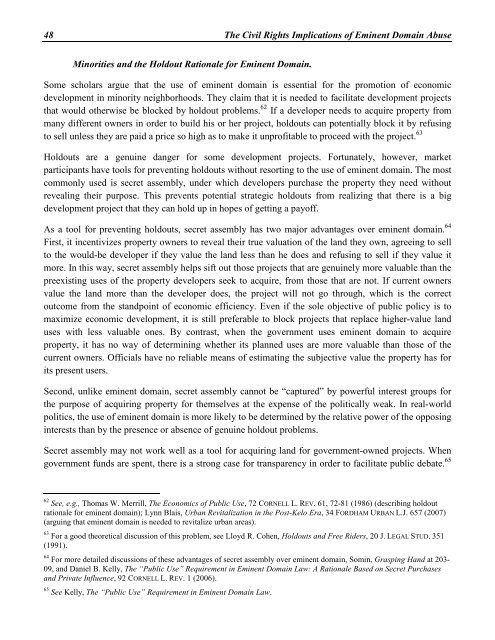You also want an ePaper? Increase the reach of your titles
YUMPU automatically turns print PDFs into web optimized ePapers that Google loves.
48 The Civil Rights Implications of <strong>Eminent</strong> <strong>Domain</strong> AbuseMinorities and the Holdout Rationale for <strong>Eminent</strong> <strong>Domain</strong>.Some scholars argue that the use of eminent domain is essential for the promotion of economicdevelopment in minority neighborhoods. They claim that it is needed to facilitate development projectsthat would otherwise be blocked by holdout problems. 62 If a developer needs to acquire property frommany different owners in order to build his or her project, holdouts can potentially block it by refusingto sell unless they are paid a price so high as to make it unprofitable to proceed with the project. 63Holdouts are a genuine danger for some development projects. Fortunately, however, marketparticipants have tools for preventing holdouts without resorting to the use of eminent domain. The mostcommonly used is secret assembly, under which developers purchase the property they need withoutrevealing their purpose. This prevents potential strategic holdouts from realizing that there is a bigdevelopment project that they can hold up in hopes of getting a payoff.As a tool for preventing holdouts, secret assembly has two major advantages over eminent domain. 64First, it incentivizes property owners to reveal their true valuation of the land they own, agreeing to sellto the would-be developer if they value the land less than he does and refusing to sell if they value itmore. In this way, secret assembly helps sift out those projects that are genuinely more valuable than thepreexisting uses of the property developers seek to acquire, from those that are not. If current ownersvalue the land more than the developer does, the project will not go through, which is the correctoutcome from the standpoint of economic efficiency. Even if the sole objective of public policy is tomaximize economic development, it is still preferable to block projects that replace higher-value landuses with less valuable ones. By contrast, when the government uses eminent domain to acquireproperty, it has no way of determining whether its planned uses are more valuable than those of thecurrent owners. Officials have no reliable means of estimating the subjective value the property has forits present users.Second, unlike eminent domain, secret assembly cannot be “captured” by powerful interest groups forthe purpose of acquiring property for themselves at the expense of the politically weak. In real-worldpolitics, the use of eminent domain is more likely to be determined by the relative power of the opposinginterests than by the presence or absence of genuine holdout problems.Secret assembly may not work well as a tool for acquiring land for government-owned projects. Whengovernment funds are spent, there is a strong case for transparency in order to facilitate public debate. 6562 See, e.g., Thomas W. Merrill, The Economics of Public Use, 72 CORNELL L. REV. 61, 72-81 (1986) (describing holdoutrationale for eminent domain); Lynn Blais, Urban Revitalization in the Post-Kelo Era, 34 FORDHAM URBAN L.J. 657 (2007)(arguing that eminent domain is needed to revitalize urban areas).63 For a good theoretical discussion of this problem, see Lloyd R. Cohen, Holdouts and Free Riders, 20 J. LEGAL STUD. 351(1991).64 For more detailed discussions of these advantages of secret assembly over eminent domain, Somin, Grasping Hand at 203-09, and Daniel B. Kelly, The “Public Use” Requirement in <strong>Eminent</strong> <strong>Domain</strong> Law: A Rationale Based on Secret Purchasesand Private Influence, 92 CORNELL L. REV. 1 (2006).65 See Kelly, The “Public Use” Requirement in <strong>Eminent</strong> <strong>Domain</strong> Law.


